-
ORIGINAL ARTICLE12-13-2024
Nurses’ experience regarding patient safety in mobile pre-hospital care
Revista Brasileira de Enfermagem. 2024;77(5):e20230529
Abstract
ORIGINAL ARTICLENurses’ experience regarding patient safety in mobile pre-hospital care
Revista Brasileira de Enfermagem. 2024;77(5):e20230529
DOI 10.1590/0034-7167-2023-0529
Views0See moreABSTRACT
Objectives:
to understand nurses’ experience regarding patient safety in mobile pre-hospital care.
Method:
a qualitative, exploratory and descriptive study, conducted with nurses active in mobile pre-hospital care services. Semi-structured interviews were conducted, audio-graved and submitted to Bardin’s content analysis.
Results:
from four thematic categories established, nurses reported the care and management skills necessary to work in this service. They demonstrated a commitment to ensuring safe care for patients, staff and spectators. They highlighted the actions taken to prevent and mitigate incidents. However, they based their experiences on practice protocols and individual actions, expressing the need to improve knowledge about patient safety.
Final Considerations:
mobile pre-hospital care nurses’ experience in relation to patient safety was limited, suggesting the need for training on the subject, alignment of work processes and implementation of strategies, aiming to guarantee safe care.
-
ORIGINAL ARTICLE12-13-2024
Stress in nursing workers caring for people with COVID-19
Revista Brasileira de Enfermagem. 2024;77(5):e20230542
Abstract
ORIGINAL ARTICLEStress in nursing workers caring for people with COVID-19
Revista Brasileira de Enfermagem. 2024;77(5):e20230542
DOI 10.1590/0034-7167-2023-0542
Views1See moreABSTRACT
Objectives:
to analyze stress from the perspective of nursing workers caring for people with COVID-19 in a public hospital in the Recôncavo region of Bahia.
Methods:
this is an exploratory qualitative study, conducted through semi-structured interviews. The data were analyzed using word clouds, similarity trees, and content analysis.
Results:
nursing workers were exposed to stress while attending to patients with COVID-19. The reported stressors in the workplace included: work overload, lack of planning, speed in performing tasks, fatigue, lack of participation in decision-making, lack of support from management, technological changes, excessive responsibility without preparation, interpersonal conflicts, and professional undervaluation.
Conclusions:
exposure to these stressors leads to emotional exhaustion and demotivation, which were intensified during the COVID-19 pandemic.

-
ORIGINAL ARTICLE12-13-2024
Knowledge and attitudes of nursing students regarding the sexuality of older adults: a quasi-experimental study
Revista Brasileira de Enfermagem. 2024;77(5):e20240011
Abstract
ORIGINAL ARTICLEKnowledge and attitudes of nursing students regarding the sexuality of older adults: a quasi-experimental study
Revista Brasileira de Enfermagem. 2024;77(5):e20240011
DOI 10.1590/0034-7167-2024-0011
Views0See moreABSTRACT
Objectives:
to compare the knowledge and attitudes of nursing students regarding sexual behavior and sexually transmitted infections (STIs) in older adults before and after an educational intervention.
Methods:
this quasi-experimental study involved a convenience sample of 45 nursing students from a public university, conducted in three stages: pre-intervention, intervention, and post-intervention. A questionnaire was used to assess sociodemographic characteristics, academic training, and knowledge and attitudes on the topic. The intervention was an educational web conference. Paired t-test and Wilcoxon test were used for data analysis.
Results:
there was a statistically significant difference in the knowledge and attitude scores of nursing students before and after the educational intervention (p < 0.001). A significant increase was observed in the knowledge score (from 9.3 to 12.2) and attitude score (from 108 to 117.2) in the post-intervention phase.
Conclusions:
the knowledge of nursing students regarding the sexuality of older adults increased after the educational intervention, and their attitudes on the subject became more positive.

-
ORIGINAL ARTICLE12-13-2024
Educational booklet on labor and delivery: validity study
Revista Brasileira de Enfermagem. 2024;77(5):e20240138
Abstract
ORIGINAL ARTICLEEducational booklet on labor and delivery: validity study
Revista Brasileira de Enfermagem. 2024;77(5):e20240138
DOI 10.1590/0034-7167-2024-0138
Views2See moreABSTRACT
Objectives:
to develop and validate an educational booklet on labor and delivery for pregnant women.
Methods:
this methodological study involved constructing and validating a booklet based on Echer’s framework. We used the Content Validity Index and Cronbach’s alpha for content and face validation, selecting judges according to Fering’s criteria. We then conducted a clinical validation with the target population.
Results:
the booklet, developed based on evidence from an integrative review and validated by judges and the target audience, achieved global Content Validity Index of 0.919 and 0.913, respectively. After clinical validation with 22 pregnant women, it included 28 topics and 48 pages, with illustrations by a graphic designer.
Conclusions:
expert judges and the target audience considered this educational technology valid, deeming it a relevant tool for promoting the health of pregnant women.

-
12-08-2024
Contexto ibero-americano da enfermagem: construindo e compartilhando conhecimento
Revista Brasileira de Enfermagem. 2024;77(1):e770101
Abstract
Contexto ibero-americano da enfermagem: construindo e compartilhando conhecimento
Revista Brasileira de Enfermagem. 2024;77(1):e770101
DOI 10.1590/0034-7167.2024770101pt
Views0Na próxima semana, acontecerão dois grandes eventos científicos em Madri e Granada (Espanha). Serão atividades internacionais, específicas e de forma muito especial, embora não exclusivas do campo ibero-americano, organizadas e desenvolvidas por duas sociedades científicas de enfermagem muito importantes, como a Associação de Enfermagem Comunitária (AEC) e a Associação Latino-Americana de Escolas e Faculdades de […]See more -
ORIGINAL ARTICLE12-08-2024
Initial nipple damages in breastfeeding women: analysis of photographic images and clinical associations
Revista Brasileira de Enfermagem. 2024;77(1):e20220773
Abstract
ORIGINAL ARTICLEInitial nipple damages in breastfeeding women: analysis of photographic images and clinical associations
Revista Brasileira de Enfermagem. 2024;77(1):e20220773
DOI 10.1590/0034-7167-2022-0773
Views0See moreABSTRACT
Objective:
to analyze the initial nipple damage degree by breastfeeding practice and to associate findings with clinical manifestations of breastfeeding women.
Methods:
a retrospective, cross-sectional study with primary data and photographic images database from two randomized clinical trials. Photographic images were analyzed by two independent evaluators using the Nipple Trauma Score. For analysis, the chi-square, Mann-Whitney tests and Kappa coefficient were applied.
Results:
115 breastfeeding women and their respective 186 photographic images were analyzed. The degree of agreement of evaluators using the Nipple Trauma Score was 93.6%. The nipple pain score during breastfeeding was moderate and compromised more than 25% of the nipple surface area.
Conclusions:
assistance to breastfeeding women should prioritize nipple pain intensity instead of the nipple damage size.

-
REVIEW12-08-2024
Interventions for Strengthening General Self-Efficacy Beliefs in College Students: An Integrative Review
Revista Brasileira de Enfermagem. 2024;77(1):e20230192
Abstract
REVIEWInterventions for Strengthening General Self-Efficacy Beliefs in College Students: An Integrative Review
Revista Brasileira de Enfermagem. 2024;77(1):e20230192
DOI 10.1590/0034-7167-2023-0192
Views0See moreABSTRACT
Objective:
To assess the evidence regarding the effectiveness of interventions aimed at strengthening self-efficacy beliefs in college students.
Methods:
Integrative Review conducted on the Lilacs, PubMed, CinahL, Cochrane Collaboration Databases, Scopus, and PsycInfo databases. The methodological quality of the studies was assessed using tools proposed by the Joanna Briggs Institute, and the results were analyzed descriptively.
Results:
Out of the 10 selected studies, six demonstrated that interventions aimed at strengthening self-efficacy were effective (Levels of Evidence II and III), and four revealed contrary results (Levels of Evidence I and II). Programs aimed at enhancing self-efficacy should include content on positive mental health, psychoeducation strategies, cover a period of eight to twelve weeks, and consider the completion of homework assignments.
Conclusion:
The synthesis of evidence pointed to pathways for building an effective self-efficacy strengthening program to be implemented in universities.

-
REVIEW12-08-2024
Common mental disorders in hematopoietic stem cell transplant patients: a scoping review
Revista Brasileira de Enfermagem. 2024;77(1):e20220581
Abstract
REVIEWCommon mental disorders in hematopoietic stem cell transplant patients: a scoping review
Revista Brasileira de Enfermagem. 2024;77(1):e20220581
DOI 10.1590/0034-7167-2022-0581
Views0See moreABSTRACT
Objective:
to map common recurrent mental disorders in patients undergoing hematopoietic stem cell transplantation.
Methods:
this is a scoping review carried out in January 2022 in electronic databases and repositories of dissertations and thesis. Studies that answered the research question, met the objective of the study and were available in full electronically, in any language, were included.
Results:
the sample consisted of 28 studies, 14 of which were published in the United States of America. The common mental disorders found were depressive, anxiety, post-traumatic stress and mood disorders. Twenty symptoms were mentioned, among the most prevalent are fatigue and sleep disorders/insomnia.
Conclusions:
the difficulty and importance of carrying out the differential diagnosis of these disorders were highlighted, since their symptoms can be confused with other health problems and have a strong potential to interfere with patients’ evolution.

-
ORIGINAL ARTICLE12-04-2023
Burnout, ethical climate and work organization in covid-19 intensive care units: mixed method study
Revista Brasileira de Enfermagem. 2023;76:e20220684
Abstract
ORIGINAL ARTICLEBurnout, ethical climate and work organization in covid-19 intensive care units: mixed method study
Revista Brasileira de Enfermagem. 2023;76:e20220684
DOI 10.1590/0034-7167-2022-0684
Views0See moreABSTRACT
Objectives:
to analyze the association between burnout and the perception of the ethical climate in nursing professionals in the covid-19 Intensive Care Unit and the relationship with the organization of work from the perspective of managers of these units.
Methods:
mixed method study conducted in three university hospitals in southern Brazil from December 2021 to March 2022. A cross-sectional study was developed with 110 nursing professionals, followed by an exploratory-descriptive study through semi-structured interviews with six managers. Descriptive and analytical statistics and discursive textual analysis were used.
Results:
the prevalence of burnout was 10% and the perception of negative ethical climate was 24.5%. The association between burnout and ethical climate revealed overload and fatigue during working hours, related to tension, fear, and stress that emerged from the consequences of the organization and relations of work in the covid-19 Intensive Care Unit.
Conclusions:
there was an association between burnout and ethical climate and elements of the work organization.
-
ERRATUM02-26-2024
ERRATUM
Revista Brasileira de Enfermagem. 2024;77(1):e20160061
Abstract
ERRATUMERRATUM
Revista Brasileira de Enfermagem. 2024;77(1):e20160061
DOI 10.1590/0034-7167.20247701e03
Views2In the article “Nurses in the labor market: professional insertion, competencies and skills”, with DOI number: , published in Revista Brasileira de Enfermagem, 2017;70(6):1220-6, on page 1225:Include before REFERENCES:[…]See more -
ERRATUM06-14-2024
ERRATUM
Revista Brasileira de Enfermagem. 2024;77(2):e2024n2e06
Abstract
ERRATUMERRATUM
Revista Brasileira de Enfermagem. 2024;77(2):e2024n2e06
DOI 10.1590/0034-7167.20247702e06
Views2In the article “Is there scientific relevance to the plot of films and documentaries about eating disorders?”, with DOI number: , published in Revista Brasileira de Enfermagem, 2024;77(1):e20220547, page 7:Where it read:[…]See more -
ORIGINAL ARTICLE07-29-2024
Educational technology for multidisciplinary training for managing waiting lists for elective patients
Revista Brasileira de Enfermagem. 2024;77(3):e20230299
Abstract
ORIGINAL ARTICLEEducational technology for multidisciplinary training for managing waiting lists for elective patients
Revista Brasileira de Enfermagem. 2024;77(3):e20230299
DOI 10.1590/0034-7167-2023-0299
Views1See moreABSTRACT
Objectives:
to construct and assess an educational technology for managing patient waiting lists for multidisciplinary training.
Methods:
study supported by Instructional Design – ADDIE model, whose stages of construction of educational technology were developed in the form of a multi-professional training course. Its respective content assessment was carried out by a committee of experts from 2021 to 2022. The analysis occurred based on the proportion of content adequacy with 95% Confidence Interval.
Results:
seventeen products were created as educational technology learning objects: five storyboards; four videos; three comic books; two pedagogical action plans; a mind map; and a YouTube® playlist. Nine experts assessed content adequacy, which reached 0.89.
Conclusions:
this educational technology contributes to the performance of professionals who manage waiting lists by reducing inequalities, alleviating differences, in addition to promoting equity in care and good health for patients in the Brazilian Health System.

-
REVIEW11-22-2024
Spirituality and religiosity in children, adolescents and their families in a vulnerable context: a scoping review
Revista Brasileira de Enfermagem. 2024;77(5):e20230425
Abstract
REVIEWSpirituality and religiosity in children, adolescents and their families in a vulnerable context: a scoping review
Revista Brasileira de Enfermagem. 2024;77(5):e20230425
DOI 10.1590/0034-7167-2023-0425
Views1See moreABSTRACT
Objective:
to map evidence in the literature on the spirituality and religiosity of children, adolescents and their families in social vulnerability.
Methods:
this is a scoping review based on the JBI methodology, with the search without delimiting the time period, in English, Portuguese and Spanish, in the Virtual Health Library, PubMed, Embase, Cochrane Library, Scopus and Web of Science databases.
Results:
twenty-two studies were identified. The most studied population were adolescents, followed by children and their families. Regarding the setting, the context of vulnerability related to the low socioeconomic level experienced by these populations was highlighted. Furthermore, spirituality and religiosity were considered important for coping, social support, purpose and strength.
Conclusion:
there is an influence of spirituality and religiosity in the lives of children, adolescents and families, being a protective factor and a source of comfort, playing essential tools for living in context.

-
ORIGINAL ARTICLE12-13-2024
Stress in nursing workers caring for people with COVID-19
Revista Brasileira de Enfermagem. 2024;77(5):e20230542
Abstract
ORIGINAL ARTICLEStress in nursing workers caring for people with COVID-19
Revista Brasileira de Enfermagem. 2024;77(5):e20230542
DOI 10.1590/0034-7167-2023-0542
Views1See moreABSTRACT
Objectives:
to analyze stress from the perspective of nursing workers caring for people with COVID-19 in a public hospital in the Recôncavo region of Bahia.
Methods:
this is an exploratory qualitative study, conducted through semi-structured interviews. The data were analyzed using word clouds, similarity trees, and content analysis.
Results:
nursing workers were exposed to stress while attending to patients with COVID-19. The reported stressors in the workplace included: work overload, lack of planning, speed in performing tasks, fatigue, lack of participation in decision-making, lack of support from management, technological changes, excessive responsibility without preparation, interpersonal conflicts, and professional undervaluation.
Conclusions:
exposure to these stressors leads to emotional exhaustion and demotivation, which were intensified during the COVID-19 pandemic.

-
ORIGINAL ARTICLE01-13-2024
Knowledge, Attitudes, and Practices of nurses regarding blood culture collection
Revista Brasileira de Enfermagem. 2024;77(6):e20230424
Abstract
ORIGINAL ARTICLEKnowledge, Attitudes, and Practices of nurses regarding blood culture collection
Revista Brasileira de Enfermagem. 2024;77(6):e20230424
DOI 10.1590/0034-7167-2023-0424
Views2See moreABSTRACT
Objectives:
to investigate the knowledge, attitudes, and practices of nurses regarding blood culture collection.
Methods:
a cross-sectional study was conducted in five Brazilian public hospitals with 112 nurses. Data were collected using an adapted questionnaire and analyzed through descriptive and inferential statistics.
Results:
nurses who did not consider themselves capable of collecting blood cultures had a 72% lower chance of performing the collection at the recommended site and an 83% lower chance of using the same needle for blood inoculation into the vials. Nurses working in the emergency department had a 75% lower chance of knowing the international benchmark for blood culture contamination rates, and those with less than 5 years in the position decreased their chance of accuracy in this matter by 79%.
Conclusions:
there are gaps in the knowledge, attitudes, and practices of nurses regarding blood culture collection. Standardization of the technique, periodic education, supervision and guidance of the collection team, and process auditing are recommended coping strategies.

-
ORIGINAL ARTICLE01-10-2024
Inventory of ethical problems in mobile pre-hospital care
Revista Brasileira de Enfermagem. 2024;77:e20230539
Abstract
ORIGINAL ARTICLEInventory of ethical problems in mobile pre-hospital care
Revista Brasileira de Enfermagem. 2024;77:e20230539
DOI 10.1590/0034-7167-2023-0539
Views1See moreABSTRACT
Objective:
to construct and validate the content of an inventory of ethical problems experienced by nurses in mobile pre-hospital care.
Method:
a psychometric approach study, developed with the following stages: (1) instrument construction through a theoretical matrix based on deliberative bioethics, scoping review and online qualitative research; (2) content validity by judges; (3) pre-testing with Mobile Emergency Care Service nurses in various Brazilian states. For content validity analysis, the Content Validity Ratio was calculated (CVR>0.45 for judges and CVR>0.35 for the target population).
Results:
the instrument had 44 items, distributed across four dimensions.
Final considerations:
the constructed instrument presented sources of evidence of content validity, providing good psychometric measurements and constituting a useful tool for nurses’ practice in the pre-hospital setting.

-
ORIGINAL ARTICLE06-01-2020
Adolescence, pregnancy and domestic violence: social conditions and life projects
Revista Brasileira de Enfermagem. 2020;73:e20190111
Abstract
ORIGINAL ARTICLEAdolescence, pregnancy and domestic violence: social conditions and life projects
Revista Brasileira de Enfermagem. 2020;73:e20190111
DOI 10.1590/0034-7167-2019-0111
Views0See moreABSTRACT
Objective:
to analyze the social conditions and life projects of non-pregnant adolescents, pregnant adolescents and pregnant women who are victims of domestic violence.
Methods:
This is a exploratory, descriptive and comparative study of a quantitative and qualitative character. Ninety adolescents between 12 and 18 years old participated in the study, consisting of three groups: Group A (30 non-pregnant adolescents with no history of violence); Group B (30 pregnant adolescents with no history of violence); and Group C (30 pregnant adolescents with a history of violence). The tools used were a questionnaire of characterization of socioeconomic conditions, Inventory of Domestic Violence Against Children and Adolescent Phrases and structured interview.
Results:
Group C adolescents had lower schooling, higher school dropout, lower family income and short-term life projects.
Final considerations:
in life projects and social conditions (marital status, education, living conditions and family income) there was some difference between the groups.
-
REVIEW07-29-2022
Technologies used by nursing to predict clinical deterioration in hospitalized adults: a scoping review
Revista Brasileira de Enfermagem. 2022;75(5):e20210570
Abstract
REVIEWTechnologies used by nursing to predict clinical deterioration in hospitalized adults: a scoping review
Revista Brasileira de Enfermagem. 2022;75(5):e20210570
DOI 10.1590/0034-7167-2021-0570
Views1See moreABSTRACT
Objective:
to map the early clinical deterioration technologies used in nurses’ professional practice in the care of hospitalized adult patients.
Methods:
this is a scoping review, according to Joanna Briggs Institute Reviewer’s Manual, which seeks to map the main technologies for detecting early clinical deterioration of hospitalized patients available for use by nurses, summarizing them and indicating gaps in knowledge to be investigated.
Results:
twenty-seven studies were found. The most present variables in the technologies were vital signs, urinary output, awareness and risk scales, clinical examination and nurses’ judgment. The main outcomes were activation of rapid response teams, death, cardiac arrest and admission to critical care units.
Final considerations:
the study emphasizes the most accurate variables in patient clinical assessment, so that indicative signs of potential severity can be prioritized to guide health conducts aiming to intervene early in the face of ongoing clinical deterioration.
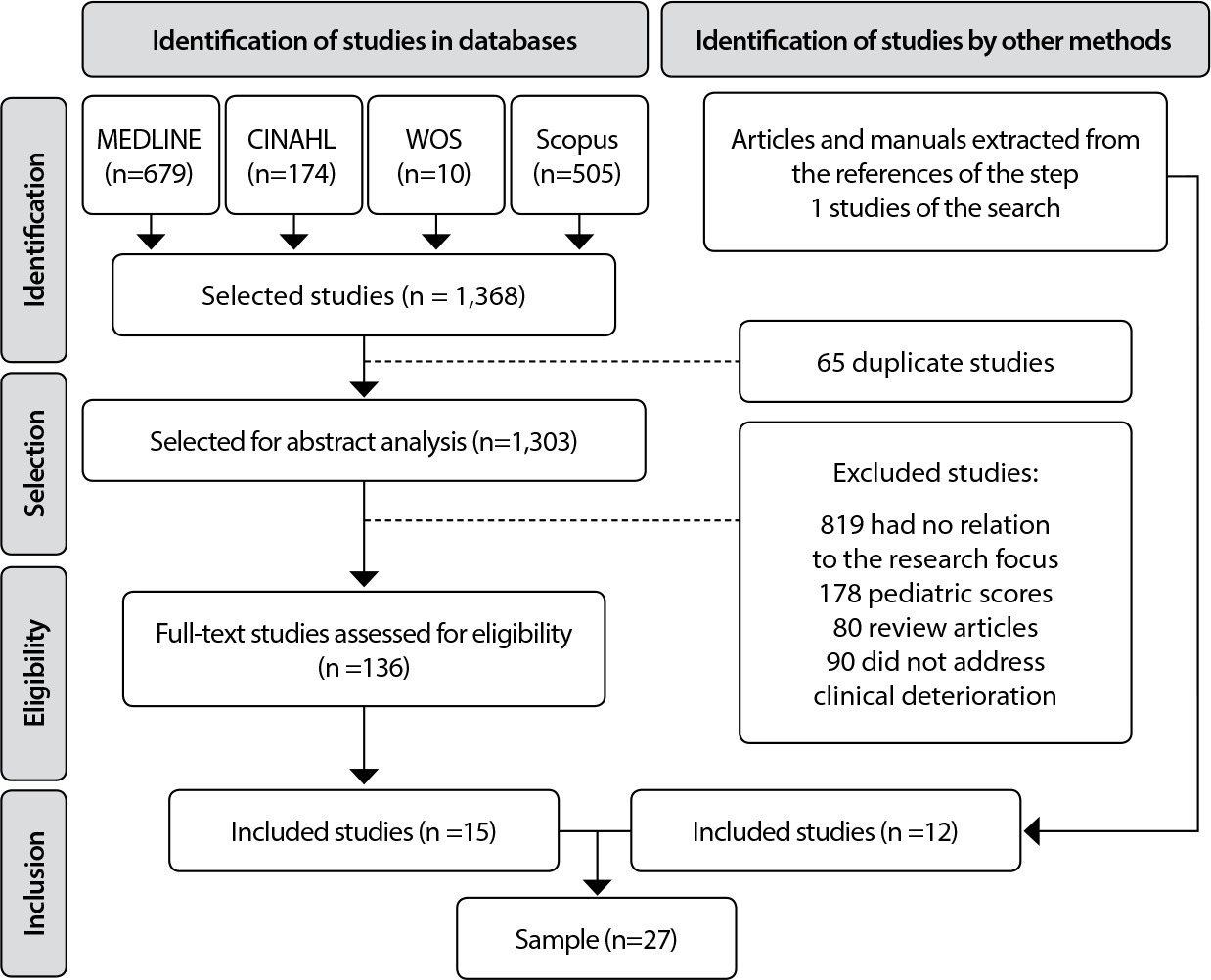
-
ORIGINAL ARTICLE10-19-2020
Hemovigilance and patient safety: analysis of immediate transfusion reactions in elderly
Revista Brasileira de Enfermagem. 2020;73:e20190735
Abstract
ORIGINAL ARTICLEHemovigilance and patient safety: analysis of immediate transfusion reactions in elderly
Revista Brasileira de Enfermagem. 2020;73:e20190735
DOI 10.1590/0034-7167-2019-0735
Views0See moreABSTRACT
Objective:
To identify immediate transfusion reactions in elders hospitalized in a public hospital in the Federal District.
Methods:
This is an observational, retrospective, documental, and analytical research, with a quantitative analysis of 516 transfusions of packed red blood cells in elders hospitalized in the largest public hospital, who required blood components, from June to December 2017, through descriptive statistics.
Results:
The sample corresponded to 46.36% of the total number of transfusions in elders in the period. The mean age was 70 years old. There were adverse effects (reactions to the transfusion) in 12 (2.3%) transfusions. Respiratory alterations (33.3%) and fever (23.8%) were the most common events.
Conclusion:
The incidence of reactions to the transfusion is below national and international rates, indicating probable undernotification, which could be associated to a lack of knowledge regarding its clinical manifestations and the lack of systematic monitoring of the transfusion.
-
ORIGINAL ARTICLE12-13-2019
Effect of nursing telemonitoring on the knowledge of obese women: clinical trial
Revista Brasileira de Enfermagem. 2019;72:212-219
Abstract
ORIGINAL ARTICLEEffect of nursing telemonitoring on the knowledge of obese women: clinical trial
Revista Brasileira de Enfermagem. 2019;72:212-219
DOI 10.1590/0034-7167-2018-0500
Views0See moreABSTRACT
Objective:
To assess the effectiveness of remote monitoring in the knowledge of overweight women.
Method:
Randomized clinical trial with 101 women, randomly assigned to the control group (CG=50) and to the intervention group (IG=51). The IG received educational intervention over the telephone, during three months and routine follow-up in the service, while the CG only received conventional follow-up. The knowledge was assessed by a specific questionnaire. Data were analyzed by the Robust Linear Regression Model, adopting a statistical significance of 5%.
Results:
In the intragroup assessment, an increase in the correct answers with a statistically significant difference was observed only for the IG in the domains: “Concept and causes of overweight,” “Complications of overweight” and “Eating habits.” In the intergroup comparison, an increase in the average knowledge was verified in the same domains for the IG (p≤0.005).
Conclusion:
nursing telemonitoring contributed positively to the improvement of women’s knowledge.
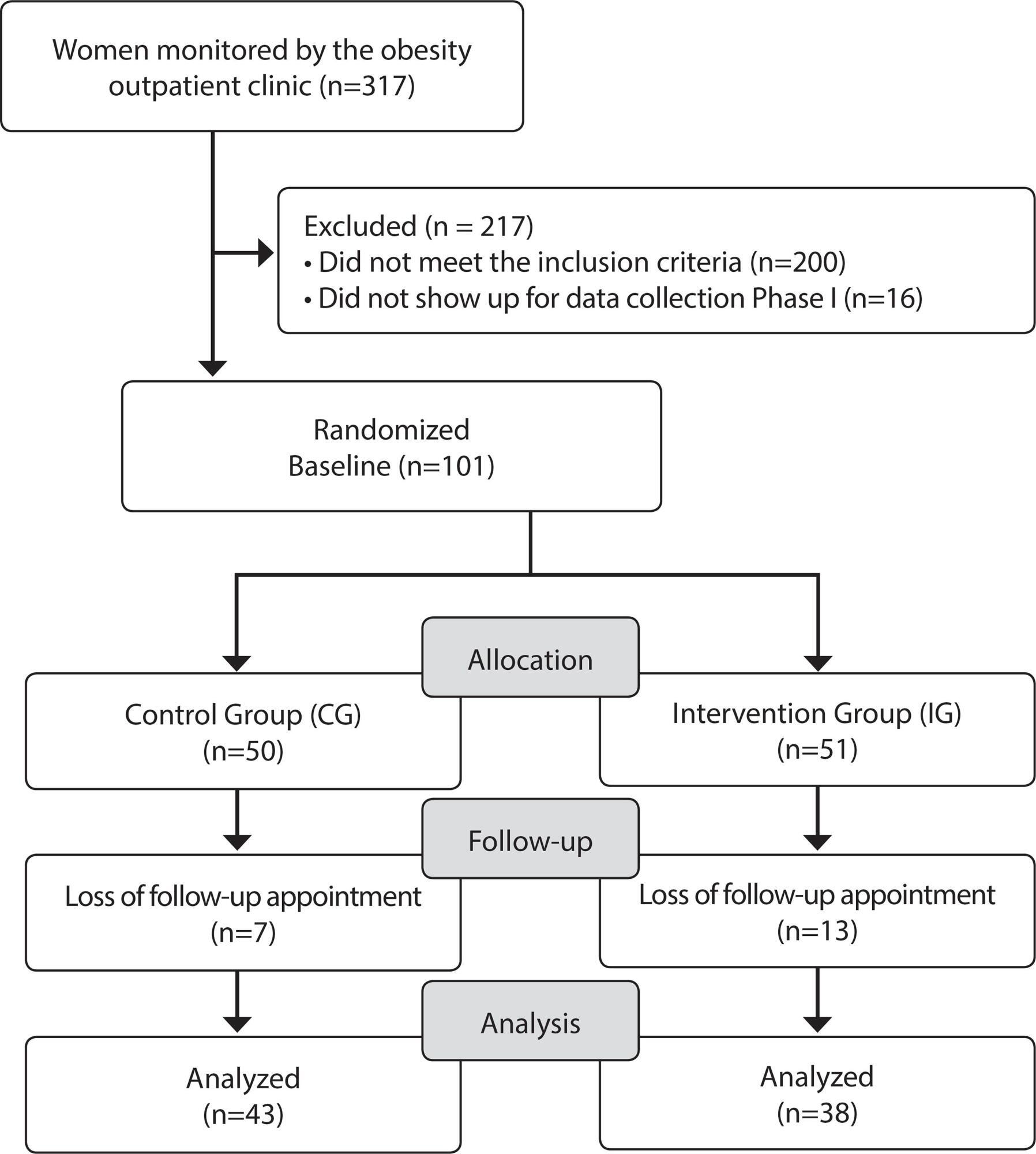
-
REVIEW09-18-2020
Cloth masks as respiratory protections in the COVID-19 pandemic period: evidence gaps
Revista Brasileira de Enfermagem. 2020;73:e20200239
Abstract
REVIEWCloth masks as respiratory protections in the COVID-19 pandemic period: evidence gaps
Revista Brasileira de Enfermagem. 2020;73:e20200239
DOI 10.1590/0034-7167-2020-0239
Views0See moreABSTRACT
Objective:
to identify scientific evidence on the effectiveness of using cloth masks as safe protectors against COVID-19.
Method:
an integrative review of articles available in full obtained at PubMed, CINAHL, and Web of Science. Controlled, non-controlled descriptors and keywords such as “mask”, “home-made” and “cloth” or “cotton” and “infection control” or “infection prevention” were used.
Results:
thirty-eight articles were selected; of these, seven studies made up the sample. Evidence shows that cloth masks do not have the same protective characteristics as surgical masks, indicating an increased risk of infection due to humidity, diffusion of fluids, virus retention, and improper preparation. Considering the shortage of surgical masks during the pandemic, cloth masks could be proposed as a last resort.
Conclusion:
cloth masks should be used together with preventive measures, such as home insulation, good respiratory conduct, and regular hand hygiene.
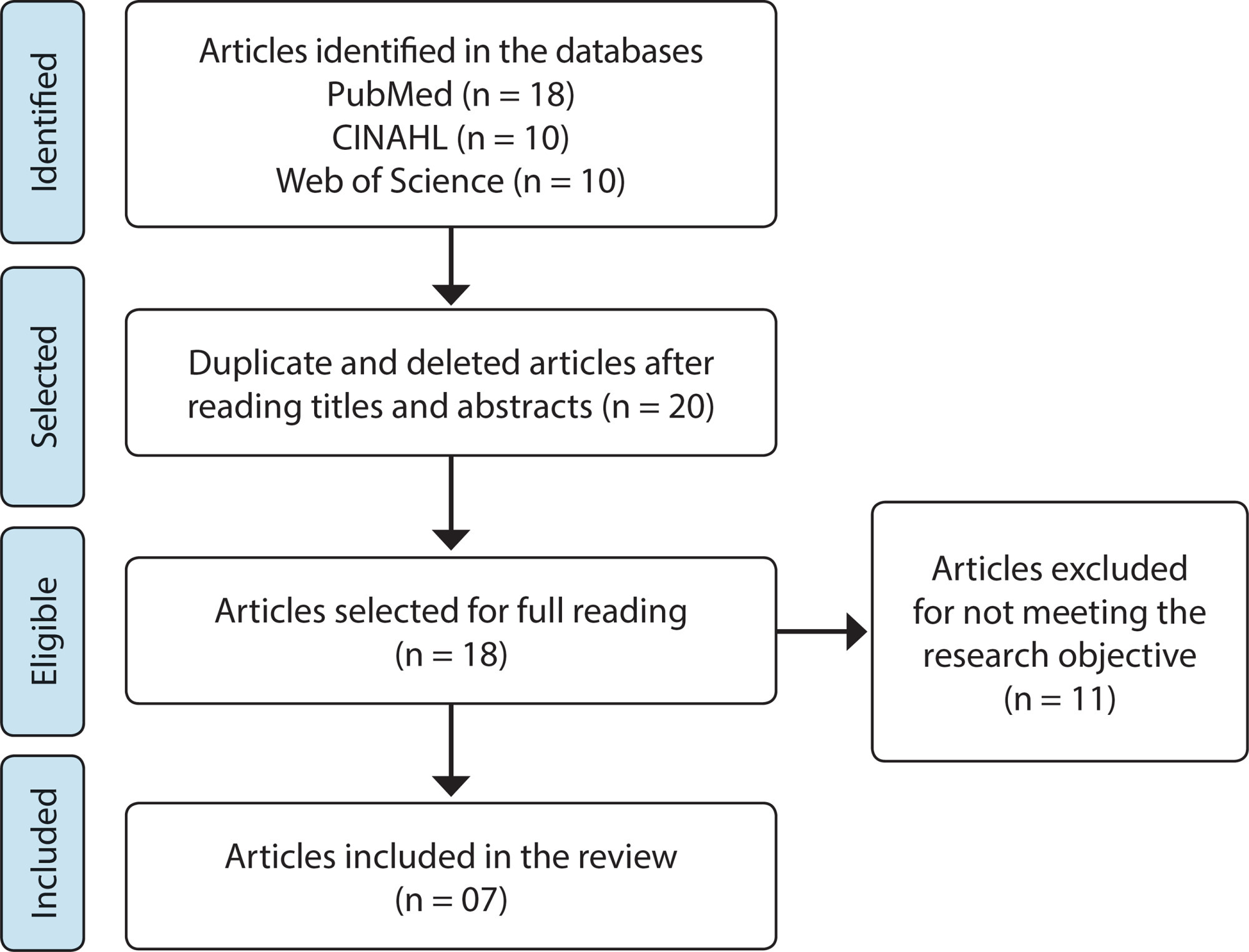
-
ORIGINAL ARTICLE07-22-2022
Effects of carbohydrate use on preoperative thirst: a randomized clinical trial
Revista Brasileira de Enfermagem. 2022;75(5):e20210355
Abstract
ORIGINAL ARTICLEEffects of carbohydrate use on preoperative thirst: a randomized clinical trial
Revista Brasileira de Enfermagem. 2022;75(5):e20210355
DOI 10.1590/0034-7167-2021-0355
Views0See moreABSTRACT
Objectives:
to evaluate the effectiveness of carbohydrate popsicles, carbohydrate solution, and usual care (fasting) on the intensity and discomfort of preoperative thirst.
Methods:
a randomized clinical trial with 60 preoperative patients aged between 18 and 60 years, randomized into three groups: control (fasting), carbohydrate solution (100 ml), and carbohydrate popsicle (100 ml). The outcomes were thirst intensity and discomfort.
Results:
there was a difference between groups for final thirst intensity (p = 0.01) and final thirst discomfort (p = 0.001). The effect size for both the Solution Group and the Popsicle Group was robust: 0.99 and 1.14, respectively.
Conclusions:
the groups that received the carbohydrate fasting abbreviation showed a reduction in thirst discomfort compared to the control group. The carbohydrate popsicle proved more effective in reducing the intensity of thirst. NCT: 3.209.283
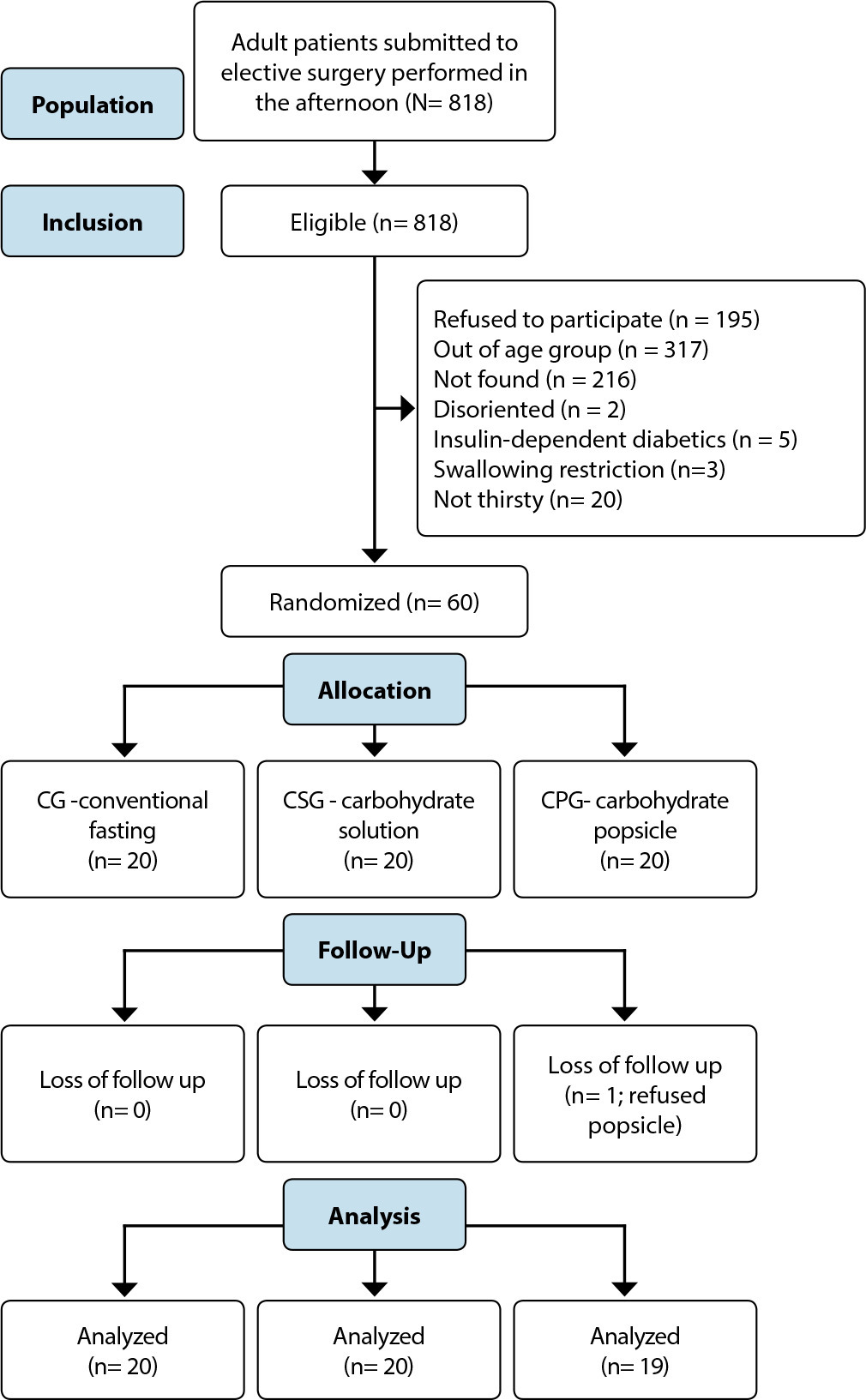
-
ORIGINAL ARTICLE07-30-2021
Construction and validation of self-care educational technology for caregivers
Revista Brasileira de Enfermagem. 2021;74(4):e20200215
Abstract
ORIGINAL ARTICLEConstruction and validation of self-care educational technology for caregivers
Revista Brasileira de Enfermagem. 2021;74(4):e20200215
DOI 10.1590/0034-7167-2020-0215
Views0See moreABSTRACT
Objectives:
to build and validate educational self-care technology for informal caregivers.
Methods:
methodological study, anchored in the Delphi technique, carried out in a municipality in the state of Paraná, Brazil, between September 2018 and November 2019. It was developed in three stages: situational diagnosis; elaboration of educational technology; content and appearance validation by expert judges and informal caregivers, using the content validity index and coefficient of variation.
Results:
after the steps of the methodological process, an educational technology called “Taking Care of Those Who Care” was produced, as an information tool that deals with the self-care of informal caregivers, receiving a content validity index above 0.86 and a variation coefficient. below 20% on all items.
Conclusions:
the educational technology was built and evaluated with satisfactory rates by the specialists and target audience, showing a high correlation of agreement, characterizing it as adequate and informative to informal caregivers.
-
ORIGINAL ARTICLE10-18-2022
Methods for measuring venous peripherally inserted central catheters in newborns
Revista Brasileira de Enfermagem. 2022;75(2):e20210045
Abstract
ORIGINAL ARTICLEMethods for measuring venous peripherally inserted central catheters in newborns
Revista Brasileira de Enfermagem. 2022;75(2):e20210045
DOI 10.1590/0034-7167-2021-0045
Views0See moreABSTRACT
Objective:
to analyze the results of insertion procedures of Peripherally Inserted Central Catheters in newborns using two measurement methods.
Methods:
this is a randomized clinical trial, presenting descriptive and exploratory results of variables. It was held at a Neonatal Intensive Care Unit. Data were collected between September 2018 and 2019. The sample analyzed was 88 catheter insertion procedures, distributed in two groups. Study approved by an Institutional Review Board and obtained registration in the country and abroad. Descriptive analysis and logistic regression of data.
Results:
modified measurement obtained a significant difference for the central catheter tip location. Elective removals and adverse events were not significant between groups; however, poor positioning was related to adverse events.
Conclusions:
between the two methods analyzed, the modified measurement obtained better results in the proper catheter tip positioning and, consequently, less risk to patients.
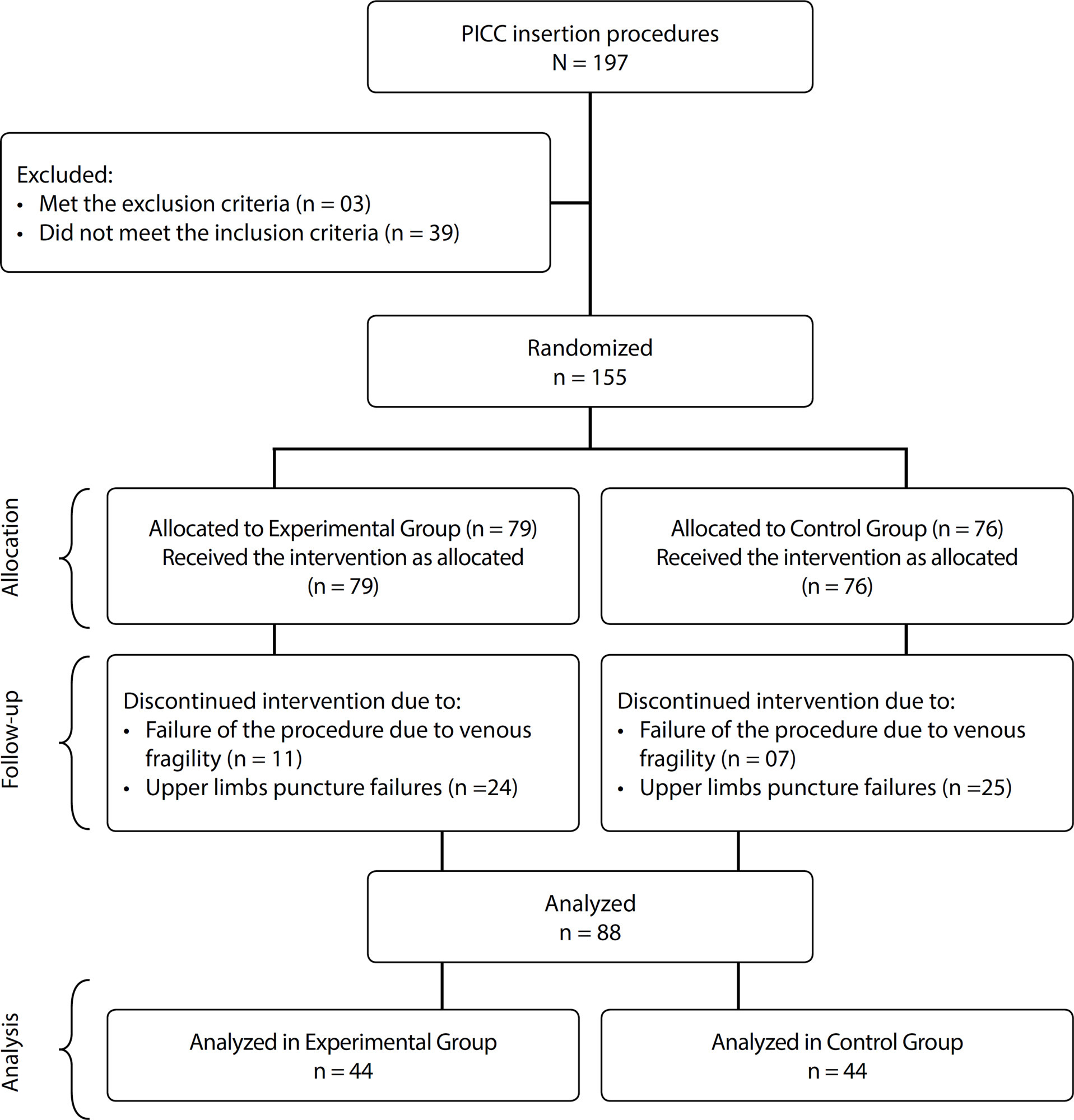
Search
Search in:
Nuvem de Tags
Adolescente (85) Atenção Primária à Saúde (239) COVID-19 (91) Criança (91) Cuidados de Enfermagem (269) Educação em Enfermagem (151) Educação em Saúde (139) Enfermagem (930) Enfermagem Pediátrica (86) Estudantes de Enfermagem (77) Estudos de Validação (131) Família (87) Idoso (208) Promoção da Saúde (99) Qualidade de Vida (104) Saúde do Trabalhador (86) Saúde Mental (145) Saúde Pública (82) Segurança do Paciente (150) Tecnologia Educacional (100)



